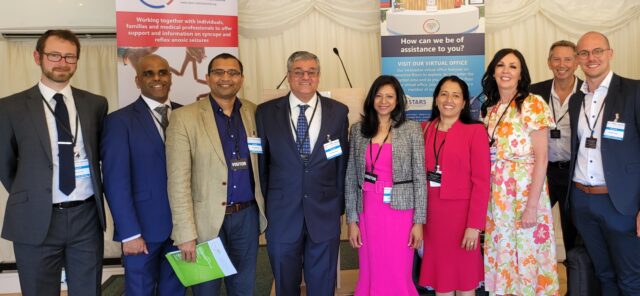Pre-2020, when no one had heard of Covid-19, stroke consultant Devesh Sinha and the rest of our team were looking to create a hub as a way to reach people in the community who were most at risk of strokes, and prevent them.
Devesh said: “When people have a stroke, they go to A&E. They need a lot of treatment and often face long hospital stays. Strokes can also profoundly affect people and their loved ones, especially when facing complications like paralysis.
“We wanted to do something different, using proactive thinking to reach out to people before they have a stroke. No stroke is good for everyone, people get to keep living their lives and there is less pressure on healthcare.”
Some of those most at risk are people with atrial fibrillation, or AF, (irregular heartbeat). One in five people with AF is likely to have a stroke. To identify those patients, we needed to work closely with our colleagues in primary care, which was one of the first innovations of what we now call our ‘AF hub’.
The most innovative thing about the hub is that it isn’t a physical place at all – everything is done virtually. Once identified via data analysis, one of our AF nurses calls high risk patients and if they agree to participate, all they need to do is download an app to their phone. This can monitor their heartbeat simply by putting their finger to the camera lens for 30 seconds a day – that information is sent directly to the team in our hub.
An alert is triggered when a patient could be at risk of having a stroke, then our team meets virtually to decide on the best treatment. Often this is as simple as taking a daily tablet, and patients can even pick up their prescription directly from their local pharmacy.
Devesh added: “We were concerned whether people would have smartphones, but we often find there is someone in the family who can help them. Most people we’ve approached have been keen to try it.
“There are several levels of innovation and it’s been a great collaboration. A more traditional way of identifying possible stroke patients is pulse checks which GPs often do. However, by working together across primary and secondary care, we’re finding several more patients than with the pulse check method.”
People without access to a smartphone are offered a face-to-face check-up with one of our AF nurses, based out of a local GP surgery.
While the initial set-up of the hub was postponed when the pandemic hit, innovations made necessary due to Covid-19 have actually worked in our favour.
Devesh said: “Initially we planned to set up a physical hub – Covid-19 was the trigger for going virtual.
“The product we’ve used, FibriCheck, made it possible to monitor the heart remotely.”
And others are starting to sit up and take notice. The project was recognised as an AF Pioneer in parliament in June; and has been shortlisted in the HSJ Patient Safety awards, as Patient Safety Pilot Project of the Year. The winners of the HSJ awards will be announced at a ceremony in Manchester on Monday 18 September.
It will also be presented at the Heart Rhythm Congress 2023 this October and the UK Stroke Forum conference in December. While our two AF nurses, Wendy Read and Suma Kuriakose, will be presenting at the European Society of Cardiology Congress in Amsterdam later this month.
And what next for the partnership itself?
Devesh added: “We’re grateful to our four GP practices and GP lead Ann Baldwin for being part of our pilot, which launched in February 2022. Now we’ve proved our model, we’re expanding it to a further 20 practices with support from our Integrated Care System colleagues.”




